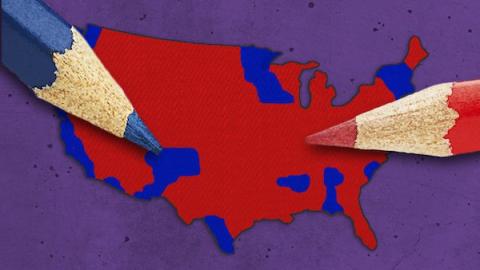Progressive politicians and pundits are collectively celebrating the Supreme Court's ruling that North Carolina illegally used racial gerrymandering to draw its congressional districts. But even author and journalist Greg Palast says those celebrating need to pump the brakes a little.
He first prefaced his statement.
"It was a good decision one way in that it defeated the idea of dumping every black person into a single congressional district," said Palast. The bad news, Palast believes, is that the ruling is not going to last.
He later added that we do need to consider racial gerrymandering when drawing electoral districts, but there is also a broader issue that violates the legal precedent of "one person, one vote" that the Supreme Court has been reluctant to weigh in on: partisan gerrymandering.
ALSO READ: ‘Two Parties, One Winner’ Shouldn’t Override ‘One Person, One Vote’
"We are hoping that Justice Kennedy might be open to arguments that vicious partisan gerrymandering really violates the 'one person, one vote' rule of the constitution. We're hoping he may see the light on that one," said Palast.
What Palast did not specifically mention is that the Supreme Court justices will consider whether or not to take up a case in Wisconsin dealing specifically with this issue, Gill v. Whitford.
Here is what you need to know:
- The Fair Elections Project filed a lawsuit on behalf of 12 Wisconsin voters, arguing that partisan-gerrymandered districts violated the First Amendment and the Equal Protection Clause of the Fourteenth Amendment of the Constitution.
- A three-judge panel on the U.S. District Court for the Western District of Wisconsin ruled in a 2-1 decision that Republican-controlled redistricting in Wisconsin amounted to gerrymandering. It further ordered the state legislature to draw new maps by the fall.
- The ruling is significant because it is the first time the courts have held that partisan gerrymandering reached such a level that it violated the rights of voters.
- The ruling is also significant because lower courts historically have elected not to take up such cases without guidance from the Supreme Court. The Supreme Court ruled in Vieth v. Jubelirer (2004) that there was no measurable or judicial standard to determine what constitutes "too partisan." Therefore, the Supreme Court refused to establish legal precedent for it.
- Wisconsin appealed the decision to SCOTUS in March. State attorneys argue that the plaintiffs' challenge violates the legal precedent set in Vieth v. Jubelirer.
- Plaintiffs filed a brief on May 9 asking the Supreme Court to uphold the lower court's ruling.
- Wisconsin officials asked the Supreme Court on Tuesday, May 23, to block the district court's order, arguing that it was so "fundamentally flawed" that the high court should reverse the decision without additional briefs or oral argument. Justice Elena Kagan requested a response to the state's application. The deadline for a response is June 7.
Partisan gerrymandering is not solely a Republican problem nor solely a Democratic problem. It is commonly talked about in the media as a scheme by the Republican Party (Palast doesn't even acknowledge the Democratic side of it), but the electoral lines in Democratic-controlled Maryland are just as bad as Republican-controlled Wisconsin.
It's a scheme by both parties to keep their majorities, maintain control of elections, and pick their voters. Both major parties don't want to get rid of partisan gerrymandering.
